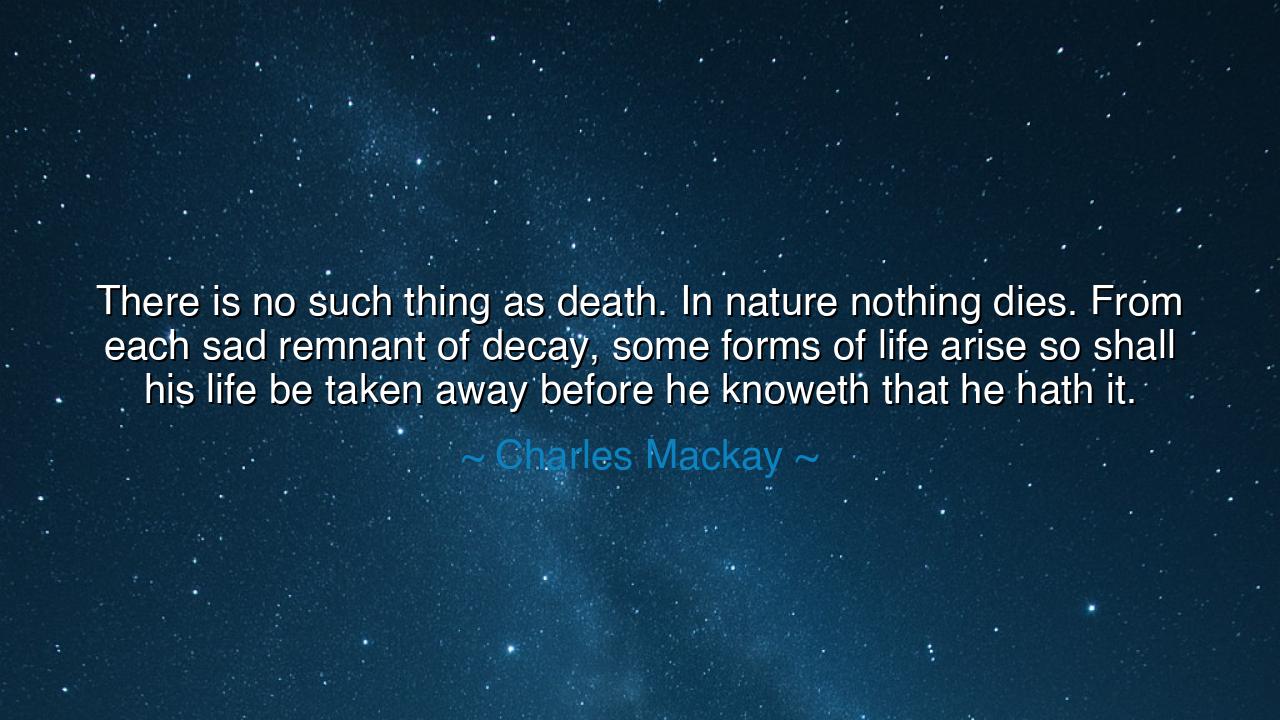
There is no such thing as death. In nature nothing dies. From
There is no such thing as death. In nature nothing dies. From each sad remnant of decay, some forms of life arise so shall his life be taken away before he knoweth that he hath it.






In the hush of old libraries and under the green vaults of forests, hear Charles Mackay—or the voice long assigned to him—declare: “There is no such thing as death. In nature nothing dies. From each sad remnant of decay, some forms of life arise …” The sentence moves like a tide upon stone, wearing down our fear and leaving a polished truth: endings are not emptiness but transfer; hush is not erasure but exchange. What we bury returns as clover and mycelium; what we mourn becomes bread for roots. The line does not deny sorrow; it transmutes it, teaching us to see the world as a great circulation where forms pass, and substance serves again.
Its meaning is double. First, it is ecological: in the world’s economy, waste is food. Fallen leaves become loam; fallen trees become nurseries for saplings; even ash fattens a future field. Matter moves from body to soil to blossom—“from each sad remnant of decay … life arises.” Second, it is spiritual and moral: if our fate is to be given back, then our living now should imitate that generosity. The wise soul learns the art of returning—time, skill, kindness—so that what leaves our hands may reappear in another’s flourishing. Thus the line heals despair not by denying death, but by enthroning purpose within it.
About the origin, a word of candor: the stanza is widely attributed to Charles Mackay (1814–1889) and is commonly quoted in anthologies and quote sites; yet at least one careful compiler notes difficulty finding it in Mackay’s published collections and flags the attribution as doubtful. In some versions, an extra phrase is appended (“…so shall his life be taken away before he knoweth that he hath it”), which looks like either a corrupted tail or a graft from another context. In short: the thought has traveled far under Mackay’s name, but the exact textual home is uncertain.
Still, the sentiment harmonizes with nineteenth-century habits of mind—Romantic reverence for nature braided with Victorian consolation. Others in that age also sang that “in nature nothing dies,” each in their cadence; the chorus is less a single poet’s property than a cultural key. If Mackay did not pen it, he could have believed it: the poet of popular delusions would have known that even our errors compost into wisdom, and our ruins feed future prudence. The line survives because the world keeps proving it true.
A story makes the lesson plain. After a winter storm, a great beech split and fell across a footpath. Children cried to see the giant down. Come spring, the “corpse” furred with mushrooms, then moss, then foxglove; beetles tunneled; wrens nested in a softened seam. By autumn the log was a school: a teacher lifted the moss and showed threads of mycelium, white as frost, stitching soil to wood. “This is how the forest keeps its promises,” she said. The beech did not vanish; it changed vocation—from shade to sustenance, from height to harvest. Grief remained, but it was braided now with gratitude.
History speaks in larger letters. When the city of Lisbon was shaken to rubble in 1755, its ashes seeded an age of reform—better building codes, new thinking about public welfare, even philosophical revolutions. The wreck did not sanctify itself; people did, by choosing that decay would be studied rather than worshiped, and that suffering would be answered with safer homes. So too in medicine: the “dissection” of tragedy has yielded vaccines and safer childbirth; the “sad remnant” is made to serve the living. The law is constant: loss that is faced honestly becomes material for mercy.
What shall we do with such a saying? First, practice the nature it proclaims: compost your scraps; plant where you have harvested; repair where you have consumed. Second, adopt the inner version: let failures become tutors—journal the lesson after each mistake so the day’s decay feeds tomorrow’s life. Third, prepare your generosity: be an organ donor; arrange your papers; bequeath tools and books to hands that will use them—so that even your leaving becomes a gift. Fourth, when mourning arrives, make a small ritual of transformation: plant a tree, fund a scholarship, start a meal train—acts that let sorrow seed good.
Carry the cadence like a charm in your pocket: no such thing as death, in nature nothing dies, remnant of decay, forms of life arise. Let it steady you when endings come and embolden you to live as if your days were already part of a larger giving. For the ancients teach, and the soil confirms: the world is a wheel, not a wall. If we join its turning—returning what we are to the common good—then even our dusk will be bright, and those who follow will find, in our remnants, a harvest.






AAdministratorAdministrator
Welcome, honored guests. Please leave a comment, we will respond soon